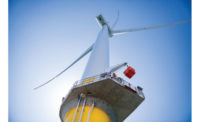Clean Energy Construction
Giant Virginia Offshore Wind Project Makes Five Key Construction Awards

Virginia utility Dominion Energy awarded five large construction contracts for its proposed 2.6-GW offshore wind energy project, set to be the largest in the U.S. when built, with its CEO reporting that project size limited the ability of a single EPC contractor to provide needed financial assurance.
In a quarterly earnings call with investors last week, President and CEO Robert Blue also reported the cost for the 176-turbine project now is $9.8 billion, up $2 billion from the original estimate in 2019 due to price hikes in steel and other key commodities, design refinement and offshore-to-onshore power transmission route changes.
Dominion has gained project insights from operation of a two-turbine pilot farm completed last year that is about 27 miles off the coast of Virginia Beach, near the larger facility’s planned 112,800-acre site.
The utility selected Denmark-based Ramboll in 2020 as owner’s engineer to support project development and engineering.
Key Project Contracts Awarded
In a Nov. 5 filing to state regulators, Dominion said construction will be managed in five contracted packages that cover about 86% of project costs. The utility previously said the project will be built under a project labor agreement.
DEME Offshore US, a Boston unit of a Belgian energy sector firm, and the South Carolina arm of Milan, Italy-based Prysmian Cables and Systems, a leading global installer of underwater energy cable systems, will provide the balance of plant engineering, procurement, transportation and installation.
The contract value is $1.9 billion, DEME Offshore announced, describing it as the largest offshore wind installation contract ever awarded in the U.S.
"This significant contract will allow us to further build out our US footprint, working with key partners and the local supply chain to grow jobs," said Sid Florey, DEME Offshore US president.
The firm also won a similar type of contract for the Vineyard 1 offshore wind project off Massachusetts that now is under construction, and one for cable installation for the South Fork project off Long Island, N.Y., with both set for completion in 2023.
Europe-based manufacturer Siemens Gamesa has the Virginia project's contract to supply, install and commission turbines that produce 14.7 MW each. A joint venture of Denmark-based Bladt Industries and SEMCO Maritime Renewables will build three 800-MW offshore substations.
Germany-based EEW Special Pipe Construction received the contract for 176 monopile foundations, which will require 200,000 tons of steel to fabricate. EEW is a partner in construction of a $250-million monopile manufacturing plant in New Jersey, but it said the Virginia foundations will be produced in Germany.
Bladt also will supply 176 transition pieces that connect monopile foundations to the wind turbine tower. “The order is the largest in our history and will occupy a significant part of our capacity in the coming years,” CEO Anders Søe-Jensen said. Transition pieces are up to 30 meters tall and about 8 m in diameter. Each weighs between 540 and 570 tons, Bladt says.
Contact values for the other awards were not disclosed.
Staging of monopile foundations, transition pieces and turbine components will be at the Portsmouth Marine Terminal as part of a previously announced 10-year lease with the Virginia Port Authority.
Impact on Ratepayers
The project is the only one in the U.S. that is utility owned, but Blue said upgraded power production capacity will limit cost impact to ratepayers. He said long-term project costs to customers will be $87/MWh, below the top range of a previous cost figure. Blue projected further cost cuts from expected congressional passage of offshore wind tax credits.
The cost also is less than the $125/MWh maximum set under Virginia’s 2020 Clean Economy Act. The state law sets a goal of producing at least 5.2 GW of offshore wind energy by 2034 and a target by 2045 for 100% carbon-free energy production in the state. It requires that clean energy construction begin by 2024. The Dominion project is set to begin work in 2023.
Blue said cost of wind farm turbines, monopiles, transition pieces, offshore substations, as well as transport and installation, total about $6.9 billion, with $1.4 billion for onshore transmission, substations and upgrades, and $1.5 billion for "other project costs and contingency." Dominion also leads a consortium to build a $500-million offshore wind turbine installation vessel. First in the U.S., it now is under construction at a Brownsville, Texas shipyard.
The wind farm cost hike includes a 4% increase in offshore costs and a $1 billion hike in onshore construction costs, said Blue. They relate to changes in the original transmission route to minimize effects on surrounding communities, including historic resources and environmental justice considerations, he said. The project includes $1.5 billion of onshore construction and $500 million of currency hedging for contracts awarded in euros and Danish krone.
Taking Off
“The timing of the Virginia offshore wind commercial project is designed to lock in scarce manufacturing and transportation slots,” Mark Mitchell, Dominion senior vice president of project construction said in testimony submitted to state regulators. More than 1,500 offshore turbines are in planning or development stages from North Carolina to Massachusetts on 17 federally leased areas, he said. The Biden Administration targets 30 GW of offshore wind deployed by 2030, with recent lease site expansion announced.
After the Nov. 2 election that flipped the Virginia House of Delegates to Republican control, Rep. Todd Gilbert, who is running to be speaker of the house, said a top focus will be rolling back climate change legislation that he claims increases costs to ratepayers by incentivizing wind and solar generation.
Republican Gov. elect Glenn Youngkin, a former executive of project finance firm Carlyle Group, said he is not opposed to wind and solar energy projects, but remains concerned about the cost impact and speed of the energy transition and the state clean energy law's impact on phasing out natural gas as a fuel source. He is described as “”very smart and common sense” by a knowledgeable industry source, with a solid background in infrastructure finance.
Dominion’s Blue said Virginia regulators generally support the company’s clean energy plans.
f





